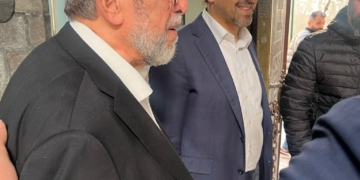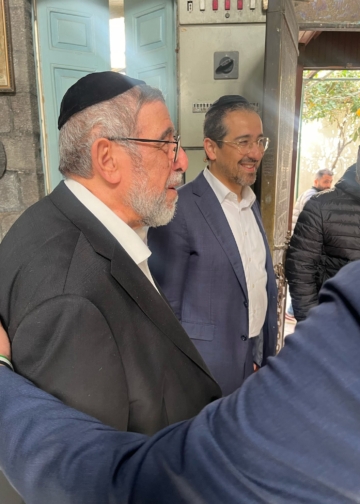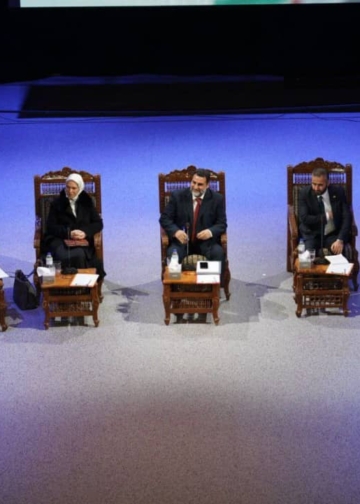This article was originally written by David Ignatius and published on the Washington Post on November 5th, 2024. You can read the article here.
Amid the roar of the 2024 presidential campaign, the United States and Israel are making significant progress toward stabilizing three dangerous wars — Israel’s tit-for-tat conflict with Iran, the devastating assault on Hezbollah in Lebanon and the brutal year-long war against Hamas in Gaza.
Sign up for the Prompt 2024 newsletter for answers to the election’s biggest questions
Antony Blinken likens the effort to trying to land three bullet-ridden aircraft without a fiery crash. A U.S. official familiar with Blinken’s thinking believes the secretary of state is close to finding safe landing zones for all three. Israel shares a similar optimism, according to an Israeli familiar with his government’s thinking. This account is based on conversation this week with these knowledgeable officials, who asked for anonymity because of the sensitivity of the topics.
One potential snarl is Israeli Prime Minister Benjamin Netanyahu’s decision Tuesday to fire Defense Minister Yoav Gallant, which came as a surprise even to close advisers of the Israeli leader. That action might muddle Israeli politics, but it also won’t alter the strong desire of the Israeli defense leadership to end these conflicts — and the Israeli insider said Tuesday that the hopeful scenario is “still relevant.”
The conflict between Israel and Iran remains the most dangerous of the three wars. Tensions seemed to ease last month after two rounds of Iranian missile attacks and pinpoint Israeli reprisals. Israel decided on a limited retaliation last month partly because the United States offered THAAD antiaircraft missiles, despite President Joe Biden’s wariness about putting the THAAD crew of about 100 U.S. troops in harm’s way.
Blinken fears that Iran will encourage Shiite militias in Iraq to launch Shahed drones into Israel, for an indirect strike. Iraq has so far escaped Israeli attacks, but Blinken has warned Iraqi Prime Minister Mohammed Shia al-Sudani that a new attack could bring a devastating Israeli response — and that Iran could be a target, too. Blinken hopes Iran has gotten the message.
“It’s not our intention to escalate” with Iran, said the Israeli source. “I don’t believe it’s Iran’s intention either,” he said, but there’s “still some room for miscalculation.”
Lebanon is the second crisis landing. U.S. diplomatic efforts for a cease-fire there have strong support from top Lebanese officials, as I discovered in conversations in Beirut last week with the prime minister and parliament speaker. They both expressed strong support for a cease-fire and deployment of the Lebanese Armed Forces in South Lebanon to disarm Hezbollah under U.N. Security Council Resolution 1701.
Israel seems ready for a Lebanon deal, too. Blinken was told Monday by a top Israeli defense official that Israel Defense Forces leadership believes it has accomplished its mission of degrading Hezbollah. “The IDF feels that now is the time to exit and go for a deal,” agreed the Israeli insider. “We are at a place where we can hopefully secure the deal in the next two weeks.”
Details of the Lebanon peace deal were hammered out last week out by Amos Hochstein, the White House mediator, during a visit to Israel. Israeli and American officials told me that there is agreement on a map defining the zone in South Lebanon where the LAF will take over from Hezbollah under 1701 and on LAF procedures for disarming the militia. Blinken expects that Lebanese Prime Minister Najib Mikati will issue a decree soon specifying the LAF’s powers.
Israel has been shocked by the breadth of Hezbollah’s network of tunnels and underground command centers in South Lebanon, provisioned with cars and motorcycles for an attack across the border that one U.S. official described as “Oct. 7 on steroids.” The IDF has cleared these Hezbollah bunkers over the past month, and the militia’s retreat offers a chance for Lebanese sovereignty that the knowledgeable Israeli described as “a unique opportunity we haven’t had in many years.”
One intriguing aspect of the Lebanon diplomacy is that both Israel and the United States want Syrian help to stop Iran from continuing to supply Hezbollah across the Syrian border. U.S. and Israeli officials believe that Syrian President Bashar al-Assad might support such controls because he has come to resent Iran’s heavy-handed presence in Damascus. If Assad limits Iranian resupply operations, the Biden administration appears ready for reciprocal gestures, on the basis of “positive steps for positive steps,” the knowledgeable American said.
“We are hopeful that we can get Assad to, at a minimum, stop the flow of arms to Hezbollah through Syria. Maybe more,” said the Israeli source. He concurred that “the U.S. is willing to give the Syrians some benefit if they go down that road.”
Gaza, the third post-conflict landing zone, might be the hardest. A year-long effort to negotiate a cease-fire and release of Israeli hostages held there appears to have stalled. Blinken now seems ready to go forward with a “day after” plan for transitional governance in Gaza — putting the issue of hostage release (and reciprocal exchange of Palestinian prisoners) on a separate track as part of a comprehensive final settlement. Israel supports this alternative, the knowledgeable Israeli said.
The Gaza transition, as envisioned by Blinken, would begin with an invitation from the Palestinian Authority to European and moderate Arab countries to provide military forces to begin stabilization operations in Gaza. The United States would provide a military command-and-control center for this effort, based in Egypt near the Gaza border.
The Gaza transitional administration would be separate from the PA but draw on some of its employees, as well as other unaffiliated Palestinians, U.S. and Israeli officials say. Foreign countries would backstop the security effort in Gaza, but non-Hamas Palestinian forces would do the hard work of maintaining law and order. The Biden administration expects that this transitional arrangement would be backed by some form of U.N. endorsement.
Blinken’s “day after” plans builds on conversations begun in July between Sheikh Abdullah bin Zayed al-Nahyan, the foreign minister of the United Arab Emirates, and Ron Dermer, who is the closest political adviser to Netanyahu. Blinken has melded their ideas with suggestions from Egypt, Jordan, Qatar and other allies.
The humanitarian situation in Gaza worsens by the day, and that’s Blinken’s most urgent concern. He and Defense Secretary Lloyd Austin wrote Israel a letter Oct. 13 demanding 15 policy changes — such as opening more border crossings and allowing more relief trucks — to improve humanitarian aid within 30 days or face a U.S. arms embargo. The source familiar with Israeli thinking said the government is taking the list “very seriously.” “You will see a trajectory of improvement on most issues by next week.”
Blinken worries that the next battleground will be the West Bank. He wants to revive promises made by Israel at a March 19, 2023, meeting in Sharm el-Sheikh, Egypt. In that deal, Israel pledged it wouldn’t discuss any new West Bank settlements for four months, wouldn’t authorize outposts for six months and would take other steps to curb violence. The communiqué was signed by Israel, Egypt, Jordan, the Palestinian Authority and the United States.
“We have no problem going back to these understandings,” said the Israeli familiar with his government’s thinking.
The list of possible breakthroughs goes on. Saudi Arabia is still discussing terms of a pact for normalization of relations with Israel, if the Gaza war ends and Netanyahu can swallow a formula for a “path toward” an eventual Palestinian state. Senate Republicans and Democrats are making plans to pass an enabling security guarantee for Saudi Arabia during the “lame duck” session of Congress in January.
There are so many opportunities to end the nightmare of war in the Middle East, at least for a time. What could possibly go wrong here? Well, it’s Election Day as I write, and Americans and Israelis both know it will be hard to plan anything until the political dust settles.
Opinion by David Ignatius
David Ignatius writes a twice-a-week foreign affairs column for The Washington Post.



















